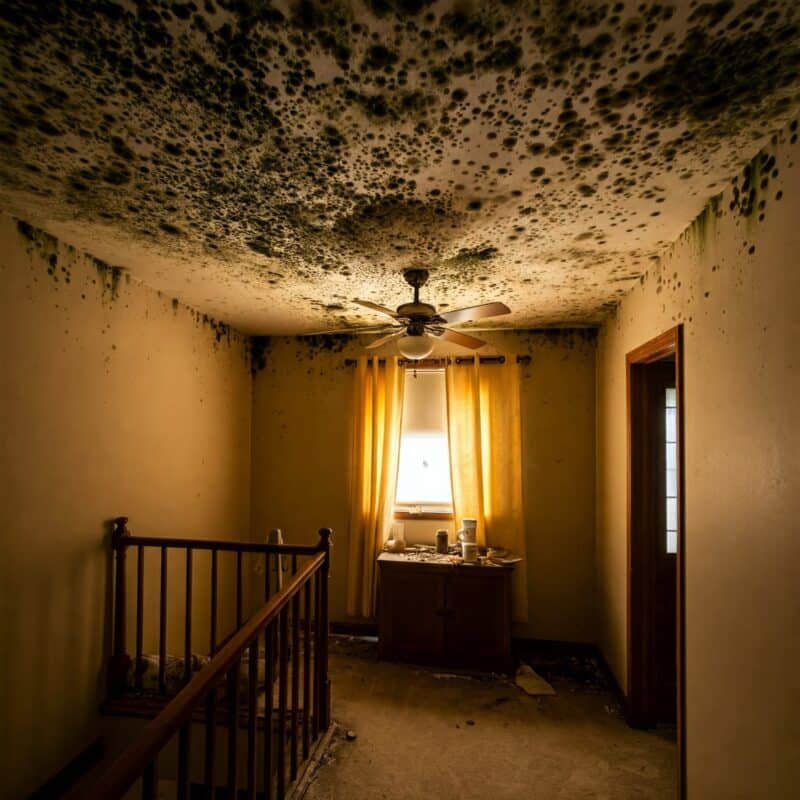Did you know that mold can cause allergic reactions and asthma symptoms in just a few hours? It’s important to know how fast mold can make you sick. This is because mold exposure time and sickness timeline can affect people differently.
Mold is a tiny fungus that grows in damp places, inside and outside. When we breathe in mold spores, they can quickly affect some people. Symptoms like sinus congestion and itchy eyes can start within hours. Others might not feel sick for a longer time, even with a lot of mold around.
How fast mold makes you sick depends on several things. These include how sensitive you are, the type and amount of mold, and how long you’re exposed. For example, people with asthma, allergies, or weak immune systems are more likely to get sick from mold. Symptoms can range from mild to severe, like breathing problems and chronic health issues.
Knowing the signs of mold exposure and taking steps to avoid it is key. Quick action to remove mold can prevent both short-term and long-term health problems.
Key Takeaways
- Mold exposure can trigger allergic reactions and asthma symptoms within hours.
- Immediate symptoms of mold exposure include sinus congestion, nasal irritation, and sneezing.
- The mold sickness timeline varies depending on individual sensitivities and exposure levels.
- People with asthma, allergies, and weakened immune systems are at higher risk of mold-related illnesses.
- Preventive measures include reducing humidity, enhancing ventilation, and cleaning moldy surfaces.
Factors Influencing Mold-Related Illnesses
The severity and onset of mold-related health issues can vary a lot. Individual allergies and sensitivities play a big role. People allergic to mold often see quick and severe symptoms like sneezing and itching.
The amount of mold matters too. More mold means a higher chance of health problems. Places with humidity over 50% are more likely to have mold, raising the risk of exposure. Jobs like farming and baking also increase the risk due to constant mold exposure.
How long you’re exposed to mold is also key. Longer exposure can make symptoms worse. This is especially true for kids, the elderly, and those with weak immune systems or chronic respiratory issues.
Being close to mold sources can also speed up symptoms. For example, carpenters and furniture makers often face health issues faster because they’re exposed more often.
Some molds, like alternaria and asper, can trigger allergies. These can make asthma worse, leading to wheezing and tightness in the chest. This shows why it’s important to deal with mold health issues quickly and well.
How quickly can mold make you sick?
The time it takes for mold to make you sick varies a lot. Some people feel sick right away, while others might not notice anything for weeks or months. People with allergies or health issues can get sick faster.
Right away, mold can cause:
- Eye and skin irritation
- Sinus congestion
- Respiratory problems such as coughing, wheezing, and difficulty breathing
For those who don’t have allergies, symptoms can take longer to show up. But, staying around mold for a long time can lead to serious health problems. These can include headaches, feeling very tired, skin rashes, and eye problems. In bad cases, it can even cause memory loss, dizziness, and extreme tiredness.
Some molds, like black mold, can cause very bad reactions. People with asthma, COPD, or weak immune systems might get sick more often. They might have headaches, trouble breathing, and feel very weak.
If you keep feeling sick after being around mold, see a doctor right away. Mold sickness can look like other illnesses. To avoid getting sick, find and get rid of the mold. Mold grows in damp places or where there’s water damage.
Experts say there are ways to deal with mold. You can test your home for mold, check the air for spores, and find where the moisture is. Using dehumidifiers and air purifiers can also help keep mold away.
Conclusion
Understanding mold exposure and its health risks is key. High humidity, certain temperatures, and water can make mold grow. This increases the chance of getting sick. So, it’s important to take steps to reduce mold at home.
Mold can cause breathing problems and make asthma worse. It can also lead to coughing and trouble breathing. People with weak immune systems are at a higher risk. Even though serious illness from mold is rare, acting fast is important to stay healthy.
Controlling humidity and fixing leaks quickly helps fight mold. If you think mold is making you sick, see a doctor. Also, getting help from mold removal experts is a good idea. Keeping your home dry and well-ventilated can help avoid health issues and make your home safer.






